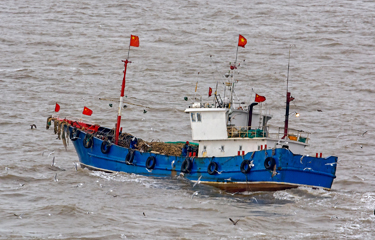An industry body in Peru has signed a memorandum of understanding with a key regional non-governmental organization, committing to better manage biodiversity in waters that are a key supply point for Chinese demand for seafood and fishmeal.
The Comité de Pesca y Acuicultura de la Sociedad Nacional de Industrias de Perú signed the agreement with Organizacion para la Protección de los Recursos del Atlántico Sur (OPRAS, also known as the Organization for the Protection of Resources in the Southwest Atlantic). The document signed by OPRAS President Alan Mackern and Alfonso Miranda Eyzaguirre, president of the fishery and aquaculture committee of the Comité de Pesca y Acuicultura de la Sociedad Nacional de Industrias, forms the basis of a cooperative partnership between private firms, producers, and non-governmental bodies work together to stop illegal, unreported, and unregulated (IUU) fishing and commit to the sustainable management and conservation of marine resources.
A global spotlight was turned on China’s fleet in Latin America this summer when Ecuador sent out a warning about Chinese trawlers massing near the Galapagos Islands, where biospheres have been impacted by shrinking stocks of fish and squid.
The MoU signing comes as the World Trade Organization convenes in Geneva on Monday, 14 September, to begin official negotiations aimed at reaching an agreement that would eliminate harmful fisheries subsidies. The negotiators have set a deadline of the end of the year to come to an agreement.
China’s government made much of a moratorium on squid fishing by the country’s vessels in the southwestern Atlantic this summer, aimed at conserving squid resources. Yet China, which classes itself as a developing nation, wants carve-outs or flexibilities for all developing nations in any WTO deal.
Isabel Jarrett, manager of The Pew Charitable Trusts’ program to end harmful fisheries subsidies, said with the negotiations, countries “are on the cusp of a conservation victory that would boost fisheries around the world.”
Jarrett has called for WTO delegates to agree on “robust rules curtailing subsidies that can lead to overfishing and overcapacity – including support for fuel and vessel construction – as well as subsidies that contribute to illegal, unreported, and unregulated fishing.”
Earlier this summer, OPRAS signed a memorandum of understanding with CALAMASUR [the Committee for the Sustainable Management of the Jumbo Flying Squid in the South Pacific], which includes industry stakeholders from Chile, Ecuador, Mexico and Peru. The goal of that memorandum is to expand cooperation in efforts against illegal and unreported fishing.
Photo courtesy of Igor Grochev/Shutterstock







